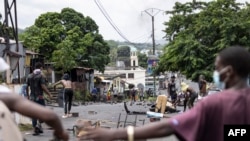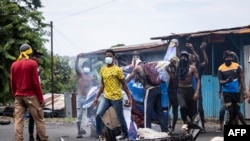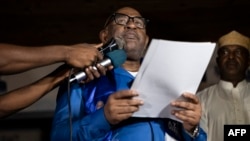Some demonstrators ransacked a former minister's house and set it on fire, as others tried to block roads in the capital. Police responded with tear gas and arrests, AFP reported.
Election officials said on Tuesday that Assoumani had won 63 percent of the vote in Sunday's ballot, but the five opposition challengers cried foul, alleging ballot-stuffing and inconsistent results.
"Incontestably, these ballots of Sunday January 14, 2024, are invalid. We denounce them and demand their pure and simple annulment," the candidates said, in a joint statement.
Debris, furniture and burning tires were scattered in several streets of the capital Moroni and the Indian Ocean archipelago's largest street market lay deserted in the morning after the disputed poll results were announced.
Tear gas shots echoed through the streets well into the afternoon and black plumes of smoke billowed over the city as police and the army tried to clear roads blockaded by the aggrieved protesters.
Government spokesman Houmed Msaidie, speaking to AFP, accused the opposition of organizing the protests.
"There have been arrests, but I can't give you the figure for the moment. It's totally normal when there are people out there who want to disturb public order," Msaidie said.
AFP did not say whether the opposition responded to the accusation from the government of being behind the unrest.
There have been no reports of deadly violence, but the Comoros — a three-island chain with a population of about 870,000 — is politically volatile and has seen 20 coups or attempted coups since independence in 1975.
Official results released Tuesday showed Assoumani — a former coup leader turned civilian president — won re-election in the first round.
Ascension to power
A former army chief-of-staff, Colonel Assoumani initially came to power in a coup in 1999, before handing over to civilian rule in 2006.
He returned to politics and won re-election in 2016 in a vote marred by violence and allegations of irregularities.
He has since been accused of creeping authoritarianism. His arch-rival ex-president Ahmed Abdallah Sambi was given a life sentence for high treason for allegedly selling passports.
During this year's campaign, Assoumani hailed his government's construction of roads and hospitals.
But in a country where 45 percent of the population live below the poverty line, plagued by electricity cuts and water shortages, he has faced popular criticism.












Forum